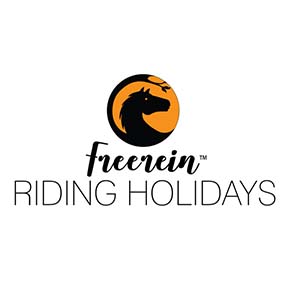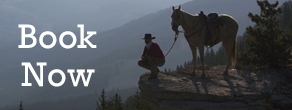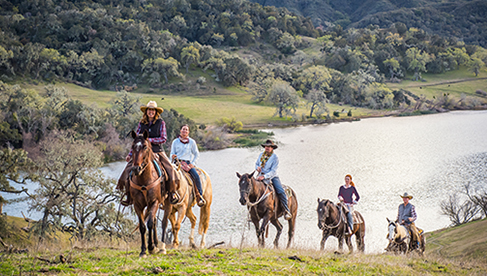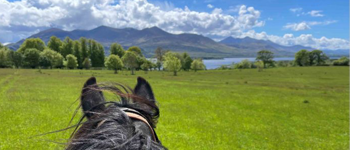A Conversation with Enlightened Horseman, Robin Shen
by: Angela Calabro
Since meeting Enlightened Horseman, Robin Shen, while working at Return to Freedom, American Wild Horse Sanctuary I have been able to learn firsthand how his techniques and training methods differ from most trainers I have seen work. After speaking with him and asking him several questions, I was able to uncover some of the reasons behind how he became the unique and successful trainer he is today.
As an experienced trainer based out of Santa Maria, California he can be looked at as a sort of Renaissance man who has used every aspect of his life to mold the way he trains, rides and enjoys his horses. Few trainers have a list of careers as fascinating and varying as Robin and yet he is constantly continuing his education in the equine field as well as other fields. Robin has an unmatched ability to make the most complicated techniques simple and easy to understand for even the most basic horseman. He somehow manages to preserve fun and enthusiasm while maintaining the importance of formal techniques and the intricacies of movement when teaching students to become a better horseman. The partnership of rider and horse, as well as the health of the horse, are crucial to Robin’s training of both owners and horses.
Angela Calabro: What do you consider your equine philosophy and what do you believe is the single most important thing for someone to understand about working with horses?
Robin Shen: Act the way you want your horse to be, and he will be the way you act, and when that moment arrives, you will no longer be acting.
Enlightened Horseman, Robin Shen, with his horse. Photo by Tricia Meteer
Angela Calabro: How would you describe yourself and your training methods and what do you think sets you apart from other trainers and horsemen?
Robin Shen: I describe myself as someone who is always learning and evolving. At least, that is what I am trying to be. What I think sets me apart is that I am constantly in search of common ground. Many people are often looking for what is different in this form or that. While I agree that it is important to search for something new, I am fascinated by what is common. When I find something that a reiner, a polo player, a dressage master, and an endurance rider have in common, then I know that it must be something absolutely essential. No one discipline has all the answers, so if you are looking for all the answers, you have to search everywhere for them. You cannot just look in one area and think you have it all figured out.
Angela Calabro: Can you tell us about your work background? I know you’ve worked as a rocket scientist as well as held many other careers. How do you think that has shaped your outlook towards horses and the equine industry in general?
Robin Shen: Coming from a technical background gives me the ability to analyze a situation dispassionately. Working within a large corporation requires a great deal of patience and perseverance and most importantly, the ability to cooperate and work within a team. It is vital to be able to work with people and machines without personalizing negative feedback. This background helps keep me calm and quiet. When a horse is disobedient, I do not take it as a betrayal. It is simply a problem with a solution somewhere and the horse and I will eventually find that solution together.
Angela Calabro: How do you think your background in the Marine Corps has influenced how you work with horses?
Robin Shen: The Marine Corps teaches that there is only one kind of leadership. And that is leadership by example. When leading troops into a dangerous combat environment, it is never enough to simply order people around. Unless you want to get shot by your own men, you must learn to earn trust. Authority is not something you can just believe you are entitled to because you are a human and the horse is a non-human. Authority is a privilege that needs to be constantly renegotiated and can never be taken for granted.
Angela Calabro: What made you realize you wanted to take a different approach to training and working with horses?
Robin Shen: Years ago I was the recipient of a horse that was given to me because no one else wanted to deal with him. Many experienced equestrians had tried, but none of them ever got the results they wanted. That was when I realized that if I did what everyone else did, than I would get what everyone else got, which was not what anybody wanted. So I had to do something different.
Angela Calabro: Why do you think it’s important to have horses that are well rounded and are just as able to go on long endurance trail rides and then ride dressage the next day?
Robin Shen: I believe that the purpose of Dressage is to prepare a horse for the trail. Just as an athlete will spend as much time lifting weights and working out in the gym as he might playing a game, so does a horse need to be fit, agile, and coordinated in order to perform on the trail at the highest levels. Well rounding your horse will reduce injuries, improve communication, increase safety, and ultimately develop partnership.
Angela Calabro: I’ve seen that you are able to ride your horses bareback and without a bridle even on beaches, how important do you think it is for riders to be able to have that connection with their horses?
Robin Shen: When the bridle and saddle are gone, all that is left is your connection. It is the raw honest truth about your relationship with your horse. If the horse wants to say “NO” to any request you make, then without tack, you have no recourse. You have no choice but to accept his refusal. This is a horse at his most honest. And I believe that a horse who is not permitted to say “No” cannot say “Yes”.
Angela Calabro: Tell me about the book you and photographer Tricia Meteer of equinoxphoto.net recently worked on together?
Robin Shen: I met Tricia through social media. I had seen her fantastic pictures online and felt that she really was able to capture a connection between horse and rider. I contacted her and we started to get excited about the concept of a picture book. We collaborated for a couple of months and took well over 3,000 photos. We started compiling these into a book of pictures with captions and it turned out to be a beautiful piece of work. I absolutely love being in Tricia’s pictures because ultimately, she seems to be able to capture the essence of what I want the world to see about me and my horse. She is definitely one of a kind.
Photo by Tricia Meteer.
Angela Calabro: After having the privilege to scurry around the beaches and dunes of Pismo Beach, Montana De’Oro State Park and many other places with Robin and his amazingly trained horses, Morgan and Rashid, it is easy to see how important it is to cultivate a strong relationship between horse and rider. Many trainers believe the most important thing is to find what makes their style different from everyone else, but what Robin has been striving to teach is that we should be focusing on the common ground that exists between all disciplines of riding. In such a small industry it is important for us to remember we all have a common love of horses and should be trying to continue our education through learning from each other and what each style can bring to the equine industry.
The simple philosophy of acting the way you want your horse to behave and one day you will turn around to realize that you and your horse have become the vision you’d hoped to be, is not only critical for the equine industry but flows over into every aspect of life.
If you would like to learn more about Robin Shen or contact him for a clinic please visit his website.






